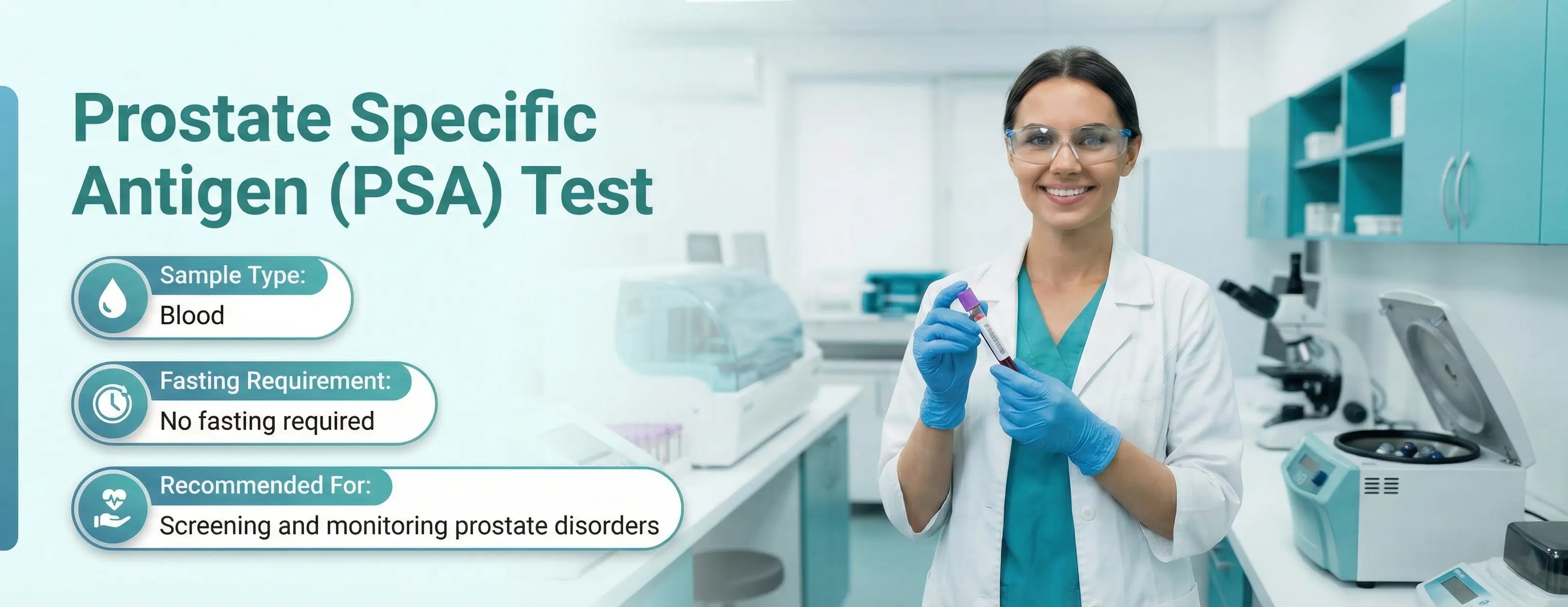1551+ orders placed in your location
100% NABL & ISO Certified Lab • 100% Accurate Reports
Prostate Specific Antigen (PSA) Test
Total PSA, Complex PSA, Free PSA
- SummaryThe Prostate-Specific Antigen (PSA) test is a blood test that measures the level of PSA in your blood. PSA is a substance produced by the prostate gland in males. The PSA levels can be elevated in benign prostatic hyperplasia, and prostate cancer. This test is done by taking a blood sample from a vein in your arm, fasting is not required for this test. Read more
- Reports Within11 HrsView Sample Report100% NABL & ISO Certified Labs
- SampleBlood
- Age35+ years
- GenderMales
- FastingNot Required
PharmEasy Promises
Know More About The Test
A quick info on PSA test
Overview
The PSA test helps determine the levels of a prostate-specific antigen in the blood. It is used to screen for prostate cancer and benign prostatic hyperplasia. Prostate-specific antigen (PSA) is a substance produced by the prostate in males. The prostate is a small gland in the male reproductive system. It secretes a fluid that forms part of the semen.
The levels of PSA in the blood are often elevated due to prostate cancer in men. The PSA test was approved in 1986 by the US Food and Drug Administration (FDA) to monitor the prognosis of prostate cancer in men who had been diagnosed with the condition. In 1994, the use of the PSA test was approved in conjunction with a digital rectal exam (DRE) to diagnose prostate cancer in asymptomatic men. A PSA test along with a DRE helps doctors diagnose the medical condition.
The PSA test detects prostate cancer, prostate infection (prostatitis) and benign prostate enlargement. Although prostatitis and prostate enlargement are benign conditions, there is no evidence that states that men with these conditions will not develop prostate cancer. Studies show that PSA ranges are lower in Indians as compared to the Western population.
The PSA test is not a very accurate test as it can give you false-positive results due to the following reasons:
- If you have had sex in the last 48 hours
- If you have masturbated in the last 48 hours
- If you have had a rectal exam
- If you have had a urinary catheter inserted
- If you have had anal sex in the last 48 hours
Every 3 in 4 men with a raised PSA level will not develop prostate cancer. The PSA test may also miss out on about 15% of cancers.
Advantages of the PSA test:
- You can relax if your PSA test results are normal.
- You can detect cancer early with this test and get treated on time.
Disadvantages of the PSA test:
- It can give false-positive or false-negative results.
- The PSA test cannot differentiate between slow-growing cancer and fast-growing cancer.
Sample Type
The PSA test is done by taking a blood sample. This test is done separately or can be done along with other routine blood tests.
Risk Assessment
Prostate Cancer, Benign prostatic hyperplasia, Prostatitis
What does this test detect?
The PSA test measures the levels of prostate-specific antigen in your body. PSA is a protein produced by the cells in the prostate gland in men. PSA levels are usually low in men. High levels of PSA indicate prostate cancer, benign prostatic enlargement or infection of the prostate gland (prostatitis).
The PSA test is suggested to people who experience the following symptoms:
- Frequent urination
- Painful urination
- Pelvic pain and/or backache
Indications for PSA Test
The PSA test is prescribed for men who have certain risk factors like:
- Increasing age - men above 50 years are more likely to develop prostate cancer
- Black ethnicity or having an African-American origin
- Strong family history of prostate cancer
- Obesity or overweight
PSA test is also used to monitor the effectiveness of treatment for prostate cancer. Once you have been diagnosed with prostate cancer, you will need to get a PSA test done for the prognosis of the disease.
How frequently should you take this test?
The PSA test is repeated based on your symptoms and your doctor’s advice. If your PSA levels are high, you may need to repeat the PSA test every 6-8 weeks for monitoring prostate cancer. If your PSA levels are within the normal range, then you can repeat the test every 2-4 years.
Test Preparation
Before the Test
Before you get your PSA test done, avoid having sex or masturbating for 24 hours minimum. These activities can release semen and raise your PSA levels. Also, consult your physician before you get the PSA test done. Avoid getting a rectal examination before your test, as that can also give you false high results.
Make sure you don’t have the following before getting a PSA test done:
- Urinary infection
- Prostate biopsy in the past 6 weeks
- Exercised heavily in the last 48 hours
- Ejaculated in the last 48 hours
During the Test
It is a simple blood test that requires about 5-10 minutes.
After the Test
There are no restrictions after the PSA test. You can resume routine work and activity.
Parameters
The PSA Test report detects the prostate-specific antigen present in your body.
Ranges
PSA test results show the levels of the prostate-specific antigen in your blood.
|
Risk for Prostate Cancer |
Range |
Interpretation |
|---|---|---|
|
Safe |
0-2.0 ng/ml |
Low chances of prostate cancer |
|
Safe for most |
< 4.0 ng/ml |
15% men have high chances of prostate cancer |
|
Borderline |
4-10 ng/ml |
25% men have high chances of prostate cancer |
|
Dangerous |
> 10 ng/ml |
1 in 2 men have high chances of prostate cancer |
The normal values and reference ranges of the test may vary from lab to lab. Please refer to the ranges mentioned in the report and consult a doctor to understand the interpretation of lab reports.
Test Result Interpretation
High PSA levels
High PSA levels could indicate the following:
- Prostate cancer - Cancer of the prostate gland.
- Prostatitis - Infection of the prostate gland.
- Benign Prostate Hyperplasia - Enlargement of the prostate gland, which is non-cancerous.
- Age - As your age increases, your PSA levels will keep increasing even without any prostate problems.
Low PSA levels
Low PSA levels could indicate the following:
- Medications - Some medicines like dutasteride and finasteride decrease your PSA levels by half. If you are on these medicines, inform your doctor before getting the PSA test done.
Price/Cost
Typically, a PSA test is priced in the range of INR 369 to INR 715. However, the price can vary based on the city and the laboratory chosen. To provide a more detailed overview, here are the average cost of PSA test in several major Indian cities:
City | Min Cost | Average Cost | Max Cost |
369 | 542 | 715 | |
369 | 542 | 715 | |
369 | 542 | 715 | |
369 | 542 | 715 | |
369 | 542 | 715 | |
369 | 542 | 715 | |
369 | 542 | 715 | |
369 | 542 | 715 | |
369 | 542 | 715 | |
369 | 542 | 715 |
Risks and Limitations
The PSA blood test is a common blood test with a very low risk of complications. Seek medical advice right away if you notice-
- Excessive bleeding following the needle insertion.
- Discomfort or swelling at the insertion site.
Limitations of the test
- Negative impact on the outcome of the test due to equipment or human errors.
- Wrong understanding of the markers.
Was This Test Information Helpful?
Please rate your experience
References
People Also Ask
What is a normal PSA by age?
Does high PSA always mean cancer?
Does a PSA test detect cancer?
Is a PSA of 6.5 Bad?
At what PSA level should a biopsy be done?
Popular Tests
Have any doubts? Ask us.
Ask us anything about the Prostate Specific Antigen (PSA) Test to understand it better
We provide trusted, expert-curated health content to support better awareness,prevention, and care.
Backed by experienced doctors, medical experts, and strict editorial standards.


